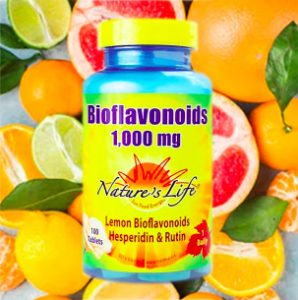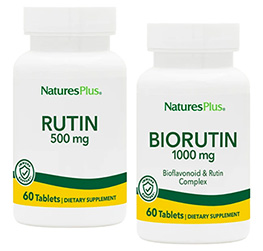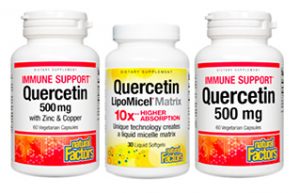Powerful & Versatile Bioflavonoids
Powerful & Versatile Bioflavonoids ~ More Than Just Antioxidants
In this newsletter we will explore the world of bioflavonoids, the powerful antioxidant compounds found in fruits and vegetables, and go into depth with some of the more well-known members with regard to their properties.
What Are They, Exactly?
Organic compounds, flavonoids, which contain three groups: flavanones, flavanols and flavones. In nature they are often associated (found) with vitamin C, and are most abundant in citrus such as lemons, grapefruit, and oranges. Bioflavonoids were initially recognized as having important activity in 1936 when it was discovered that a blend of certain flavonoids appeared to be integral in the reduction of capillary fragility and permeability (broken blood vessels). Because of this importance in blood vessel permeability, they were first termed “Vitamin P” or the permeability vitamin. This term was more or less abandoned due to controversy whether “Vitamin P” met all the accepted qualifications for vitamin status.
Bioflavonoids have received considerable study confirming their biological activity in the human body, confirming their role as biochemical assistants and antioxidants. Some of the major benefits include: increasing vitamin C absorption; strengthening capillary walls, thereby preventing damage which leads to bleeding disorders including spider and varicose veins, hemorrhages, and black and blue marks; potent anti-inflammatory activity; and antibiotic-like activity.
Citrus Bioflavonoids & Contact Sports
A 1962 study evaluated the effect of citrus bioflavonoids on athletic injuries, specifically contusions and sprains, the two most commonly-received injuries in contact sports. Forty-eight college football players were split into two groups, one receiving 300 mg of a lemon-orange bioflavonoid concentrate and the other receiving lactose, a placebo, twice a day. It was determined that the group receiving the bioflavonoid supplements had a 23% reduced duration of contusion injuries compared to the placebo group. As for sprains, the average recovery time for these injuries was 18.9% longer in the placebo group. Taking into account occurrence, severity, and duration of sprains, there was a total reduction of 58% in the players on the bioflavonoids—a highly significant feature.
The citrus bioflavonoids are comprised of several main chemicals: hesperidin, naringen, naringenin, eriocitrin, and a few others. Generally, they will be found mixed in a supplement, as they are found in the fruits. As mentioned above, these bioflavonoids enhance the absorption of vitamin C, and most quality vitamin C products will include a blend for that reason.
 Bioflavonoid supplements alone are available and Evergreen carries several. From Nature’s Life comes a 1,000 mg Bioflavonoid blend. According to the company, they are anti-inflammatory, anticarcinogenic, and antihistamine, making them beneficial for a wide array of conditions.
Bioflavonoid supplements alone are available and Evergreen carries several. From Nature’s Life comes a 1,000 mg Bioflavonoid blend. According to the company, they are anti-inflammatory, anticarcinogenic, and antihistamine, making them beneficial for a wide array of conditions.
Not all bioflavonoids come from citrus, however. Two of the most popular, quercetin and rutin, are chemically related and are found in a variety of plants.
Rutin
Rutin is found in buckwheat, red wine, bee pollen, garlic, fennel, and peppermint, with buckwheat and bee pollen the richest sources. (Buckwheat, by the way, is not related to wheat and thus contains no gluten.) Japanese soba noodles (yakisoba) are made from buckwheat and are exceedingly nutritious.
Rutin has a very large range of pharmacological activity, such as …
- Immune Support: As for immune system support, rutin may counteract allergies by antihistamine activity, inhibit inflammation, and act as an antimutagenic agent (cancer prevention). In mouse studies, oral administration of rutin inhibited the metastasis of melanoma to the lungs. Rutin-treated mice exhibited a 71% reduction in the number of lung tumor nodules.
- Cardiovascular Support: Improves blood vessel health, strengthening them and therefore may prevent disorders such as stroke, high blood pressure, hemorrhoids, bleeding gums, abnormal blood clotting, and internal bleeding. As well, it may reduce susceptibility to bruising and hasten healing, particularly when combined with vitamin C.
- Antioxidant Power: Rutin is a powerful antioxidant, and may inhibit cross-linking of collagen (therefore preserving it), inhibit the oxidation of LDL cholesterol, and has been shown to deactivate the particularly damaging superoxide free radicals. Rutin may bind to mercury and help its excretion from the body. Daily doses of 60 mg have been shown to lower intraocular pressure in glaucoma patients.
 In supplement form rutin may be found as a stand-alone in doses of 50-500 mg, or it is also often combined with other bioflavonoids. Evergreen Nutrition carries two rutin products from Nature’s Plus. Rutin is a 500 mg tablet with rutin derived from the Japanese pagoda tree (Sophora japonica). Also available is Biorutin, a stronger 1,000 mg dosage which combines rutin with a blend of citrus bioflavonoids. Both of these products are free from common allergens.
In supplement form rutin may be found as a stand-alone in doses of 50-500 mg, or it is also often combined with other bioflavonoids. Evergreen Nutrition carries two rutin products from Nature’s Plus. Rutin is a 500 mg tablet with rutin derived from the Japanese pagoda tree (Sophora japonica). Also available is Biorutin, a stronger 1,000 mg dosage which combines rutin with a blend of citrus bioflavonoids. Both of these products are free from common allergens.
Quercetin
Quercetin is very closely related to rutin chemically. Rutin is a glycoside of quercetin and they are often found together in nature. Sources are onions, apples, broccoli, squash, and red grapes. Because of their similar structure their properties are quite similar and, like its cousin rutin, quercetin is a powerful antioxidant and reduces oxidative damage to tissues.
- Anti-Inflammatory: Quercetin reduces inflammation and pain and stiffness by influencing prostaglandins and inflammatory enzymes. While relieving inflammation, it also strengthens connective tissue and unlike pain-relieving drugs does not break tissues down or cause bleeding.
- Allergies: Quercetin is a very effective antihistamine, and also helps alleviate allergies by reducing inflammatory leukotrienes, which can cause allergy symptoms.
- Diabetes: Quercetin may be of great value to diabetics as it inhibits an enzyme responsible for creating sorbitol which causes diabetic retinopathy and neuropathy. By virtue of this inhibition, it may prevent cataracts in the eye as well.
- Other Applications: Quercetin has been shown to possess anti-viral properties. It can diminish replication of viruses. It has potential anti-cancer activity as well. One laboratory study showed that cancer cells reverted to normal cells when treated with quercetin. Recently it was discovered that it acts as a zinc ionophore, facilitating transport of zinc across cell membranes. Since zinc is a notoriously poorly absorbed mineral and is critical for immune function, quercetin may now play a large role in helping the body’s immune defenses.
Your Options at Evergreen
 Evergreen carries a large selection of quercetin products. Natural Factors has three products on our shelves. Immune Support Quercetin is a vegan 500 mg capsule and they also have a version with added zinc and copper. A new addition is their LipoMicel Matrix Quercetin with 10X higher absorption. This product is in a gelatin softgel. All three products are gluten free and free of common allergens. And one of the first high-dose quercetin products is Jarrow‘s 500 mg vegan capsule which is also free of gluten and common allergens.
Evergreen carries a large selection of quercetin products. Natural Factors has three products on our shelves. Immune Support Quercetin is a vegan 500 mg capsule and they also have a version with added zinc and copper. A new addition is their LipoMicel Matrix Quercetin with 10X higher absorption. This product is in a gelatin softgel. All three products are gluten free and free of common allergens. And one of the first high-dose quercetin products is Jarrow‘s 500 mg vegan capsule which is also free of gluten and common allergens.
Back to Blog